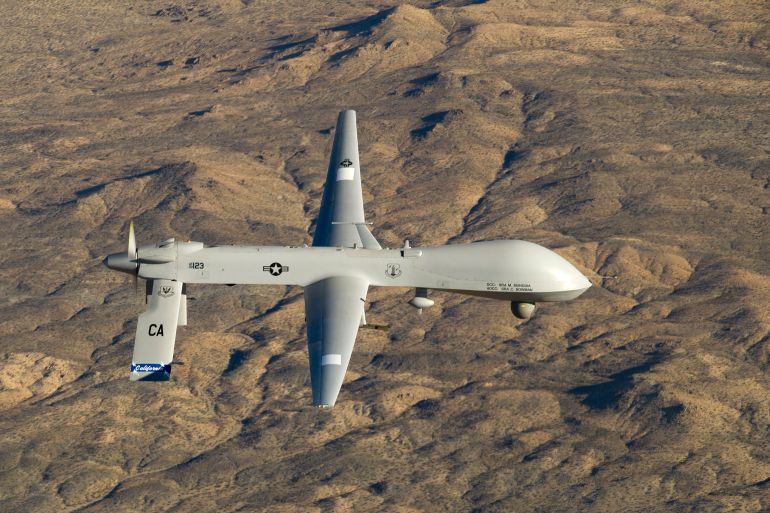Biden may keep Trump policy that upped drone exports: Report
Trump’s policy jump started drone sales to countries whose human rights records are under scrutiny.

The administration of President Joe Biden wants to keep a controversial policy from the era of his predecessor Donald Trump that jump-started sales of armed drones to countries whose human rights records are under scrutiny in the United States and elsewhere, sources familiar with the discussion have told the Reuters news agency.
When Trump’s administration reinterpreted the Cold War-era arms agreement between 35 nations, known as the Missile Technology Control Regime (MTCR), to increase drone sales, arms control advocates and some top Democratic legislators feared it would worsen global conflicts.
Keep reading
list of 3 itemsUnited States approves $600m sale of armed drones to Taiwan
How drones have added a new dynamic to conflicts
While it is too early to tell if that is the case, sales have risen.
Keeping the policy could also be at odds with Biden’s campaign pledge to “make sure America does not check its values at the door to sell arms”. When Biden was vice president under President Barack Obama, human rights groups criticised their administration for drone attacks on Taliban fighters in Afghanistan that also killed civilians.
From 2018 to 2020, Washington had been renegotiating the 33-year-old MTCR to lift agreed-upon limits on the proliferation of drone technology. But last year, Trump shelved an effort to rewrite the pact and decided to offer US drones to nearly any country that wanted to buy them.
While stealthy jets such as the $79m F-35 grab headlines, drones are far less expensive but can still execute high-risk missile attacks and surveillance missions without endangering a pilot. Many of the US-made aerial vehicles fly fast and carry big payloads, making them highly sought after while strengthening a country’s ties with the US military.
The White House National Security Council (NSC) is studying how to keep the policy in place while the Department of State is asking allies and other countries that sell drones to adopt the US position, people familiar with the matter said. Biden also wants to renew talks to lift the MTCR proliferation limits, the sources said.
Though no decision has been passed up to the under-secretary cabinet level, people briefed on internal administration talks said it was leaning towards keeping Trump’s more expansive export policy.
“They are not going to walk it back,” one of the people said of the policy that Trump had hoped would take market share from Chinese-made drones.
An official at the NSC said “the US government will continue to invoke its national discretion” and treat large drones as though they fall outside the purview of the MTCR, which was written to control the proliferation of cruise missiles.
Keeping the door open
Keeping the policy holds the door open for hundreds of millions and eventually billions of dollars in US sales to governments in Taiwan, India, Morocco, and the United Arab Emirates that in the past have been prohibited from buying them.
Human rights activists and arms control advocates are not the only sceptical voices about the Trump policy.
Members of Congress are holding up the sale of four drones to Morocco, reported by Reuters in December, over objections to the Trump administration’s move to recognise Western Sahara as Moroccan territory, people familiar with the deal told Reuters.
The NSC official said the decision to continue with the Trump policy “provides the US government the flexibility to review UAS [unmanned aerial systems] export requests” while continuing to exercise that “national discretion in ways consistent with our MTCR commitments”, as well as “our strong commitment to US national security, human rights, nonproliferation, and other foreign policy objectives”.
The MTCR classifies several of the most powerful US drones as cruise missiles because they meet the technical specifications for unpiloted aircraft in the pact.
Under Trump’s reinterpretation, the US decided to treat large strike-capable drones that cannot travel faster than 800km per hour (500mph) as though they belonged in a classification that fell outside the pact’s jurisdiction.
This allowed for easier export of Global Hawks, made by Northrop Grumman, which are not armed and used for surveillance, as well as Reapers used for both surveillance and air raids and made by General Atomics.
In the longer term, the Biden team wants to negotiate a whole new agreement just for drone exports, according to a source familiar with the situation and the NSC official.
The NSC official said the Biden team will “work with other countries to shape international standards for the sale, transfer, and subsequent use of armed UAS”.